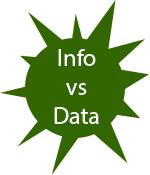Brian & Lori McCulloh
S. 7589 Tainter Hollow Rd. • Viroqua, WI 54665 • Cell (608) 606-3238
Dan & Anne Borgen (612) 618-2567
Information vs Data

Information versus Data: making sense of what genomics provides us
"I am not buying my kid an encyclopedia. He can walk to school like I did" Lawrence "Yogi" Berra
It is natural impulse for us to throw up our hands in frustration when challenged to make sense of waves of new information. There is no one equal to Yogi in the ability to express a kernel of wisdom in his malapropisms. In our particular world what he said would sound something like, "I'm going to pick the bulls that look the part to me and the hell with all the numbers!" Besides, it seems to be easy for a lot of people in our business to believe the numbers are a crock, a contrivance of an in group to manipulate the process to their advantage. Our view is that the "numbers", the EPDs have been invaluable, will continue to be so, and that it is not all that complicated.
The HD 50K produces data that verifies parentage and predicts the breeding value of an individual bull for 19 different traits. Angus Genetics, Inc. (AGI) then processes that genomic data and puts it into a usable information format by updating and reporting genomically enhanced EPDs (GE-EPDs) weekly.
The value of the genomic information is in improving the accuracy of the EPDs. The improved accuracy, according to the statisticians, of GE-EPDs can be expressed in the number of progeny records that would be required to produce equally valid phenotypically derived EPD values. Zoetis says the value of CED, for example, can change by as much as plus or minus 3 in a GE-EPD and that genomic data contributes an equivalent amount of information about unassisted deliveries as would be derived from 21 offspring of a given bull.
To sum up, let us revisit the data versus information idea. Investigation of the genome and accumulation of data to predict outcomes will continue across the entire spectrum of biology. No one can stop it. There is nothing fundamentally wrong or threatening with that process. At the same time, we believe that the interpretation of such data in our business is less than ideal, its impact sometimes exaggerated. In other words, the translation of data to usable information, actionable intelligence, is a work in progress. We believe that process will evolve and improve, particularly as more data accumulates.
Nothing in this world is perfect, including the tools we have to predict outcomes in the vast, magnificent world of biology. But EPDs are still, and will remain, the selection tools to use in choosing bulls to buy. They account for all sources of information on the individual, including pedigree, with collateral relatives' performance, individual performance, and genomic testing. They are the best tools we have and most definitely have worked for us.
Dan Borgen and Brian McCulloh


